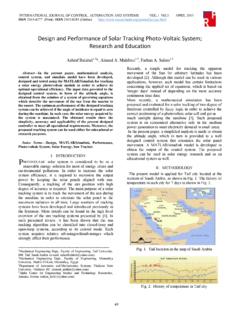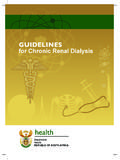Transcription of Deep T-Wave Inversions: Cardiac Ischemia or …
1 JOURNAL OF CARDIOVASCULAR DISEASE APRIL 2014 ISSN: 2330-4596 (Print) / 2330-460X (Online) 116 Abstract Cardiac memory is a unique phenomenon of electrical remodeling characterized by marked diffuse T-Wave inversions (TWI) that can mimic severe myocardial Ischemia . When misinterpreted, these often lead to unnecessary diagnostic investigations or therapeutic interventions. We report a case of an elderly female with a history of coronary artery disease that presented with diarrhea, and was incidentally found to have marked TWI following episodes of altered ventricular conduction.
2 Although these findings were concerning for severe myocardial Ischemia or an acute intra-cranial event, in the context of the patient s clinical scenario, were highly suggestive of Cardiac memory. Understanding these mechanisms of altered ventricular conduction and being familiar with such a pathologic entity is important for clinicians to prevent unnecessary testing, expert consultations, or inpatient admissions all of which can have financial and/or crucial clinical implications. Keywords T-Wave memory; Cardiac memory; myocardial Ischemia Cite this article as: Vakil K, Gandhi S, Abidi KS, et al.
3 Deep T-Wave Inversions: Cardiac Ischemia or Memory? JCvD 2014;2(2):116-118. I. INTRODUCTION Cardiac memory is a unique phenomenon of electrical remodeling seen after periods of altered ventricular conduction wherein the T-Wave direction during memory , during periods after altered depolarization, is similar to that of the QRS complex during periods of abnormal depolarization. Although it appears to be a relatively benign pathophysiologic finding, T-Wave inversions (TWI) due to Cardiac memory may lead to unnecessary testing and treatment, when misinterpreted. We report a case of Cardiac memory in a patient with deep diffuse TWI that raised concerns for and could have been potentially misinterpreted for an underlying acute Cardiac or intracranial event.
4 Received on 22 January 2014 From the Division of Cardiology (KV, KSA, VT, AS, RMK) and Internal Medicine (SG, MZ), University of Minnesota, Minneapolis, MN, USA All authors reports no conflicts of interest. *Correspondence to Dr. Kairav Vakil: 420 Delaware Street SE, Mayo Mail Code 508, Minneapolis, MN 55455 Phone: 612-656-2451; Fax: 612-626-4411 II. OUR EXPERIENCE An 87-year-old was admitted after three-days of black-tarry diarrhea. She denied having chest pain, dyspnea, or pre-syncopal symptoms. Her past history included paroxysmal atrial fibrillation (AF), intermittent complete heart block treated with a dual chamber pacemaker, and a right coronary artery stent placed 3-years prior for unstable angina.
5 An adenosine nuclear stress test, performed a month prior to admission for dyspnea, was negative for Ischemia . Physical examination revealed an elderly female in no distress with a BP of 100/60 mm Hg and HR of 65 bpm. Cardiac , pulmonary, and neurologic examination was normal. Significant labs included hemoglobin of gm% (decreased from gm% 2-months prior) and INR of The initial 12-lead ECG (Figure 1A) showed sequential atrio-ventricular (AV) pacing with a paced AV-delay of 280 msec with expected repolarization changes. On day four of her hospitalization, she had an episode of AF with rate-related LBBB (seen on prior ECGs) with concordant T- waves changes in the inferior-lateral leads (Figure 1B).
6 A subsequent ECG 2-hours later showed an atrial-paced rhythm with native QRS conduction, ventricular pacing spikes (pseudo-fusion), and diffuse, deep TWI (Figure 2) that were highly concerning for acute myocardial Ischemia . Kairav Vakil, MD*; Sheiphali Gandhi, MD; Kashan Syed Abidi, MD; Venkat Tholakanahalli, MD, FHRS; Alok Sharma, MD; Marina Zakharova, MD; Richard Madlon-Kay, MD Deep T-Wave Inversions: Cardiac Ischemia or Memory? Fig. 1. (A) Electrocardiogram on day-1 showing sequential atrio-ventricular pacing, prolonged set AV-delay (280 msec), and left-bundle-branch block (LBBB) morphology from right ventricular pacing (B) Electrocardiogram on day-4 showing atrial fibrillation with rate-related LBBB with concordant infero-lateral T-Wave changes JOURNAL OF CARDIOVASCULAR DISEASE APRIL 2014 ISSN: 2330-4596 (Print) / 2330-460X (Online) 117 The patient continued to deny having any Cardiac symptoms.
7 An echocardiogram demonstrated normal left ventricular (LV) systolic function with no wall-motion abnormality. Stable troponin-I elevations ( g/L) at , , and (lab ref: ) were noted over the next 24-hours. At this point, the internal medicine team sought cardiology consultation, and a diagnosis of T-Wave memory or Cardiac memory was made. The troponin elevations were thought to be non-specific and likely secondary to hemodynamic stress from anemia and AF in a patient with known coronary artery disease. In view of her gastrointestinal bleeding, she was managed expectantly. No further work-up for Ischemia was performed as these changes were thought to be non-pathologic.
8 The patient did well through the remainder of her hospital course and had complete resolution of these profound ECG changes at discharge. There were no reported Cardiac events at a 3-month clinic follow-up visit. III. DISCUSSION The patient s ECG findings caused understandable concern in her physicians, as these were suggestive of severe myocardial Ischemia , myocarditis, or an acute intra-cranial pathology. However, given the absence of symptoms suggestive of myocardial Ischemia , recent negative stress test, normal echocardiogram, non-specific pattern of minimal troponin elevation, and a normal neurological exam, these diffuse TWI were concluded to be consistent with Cardiac or T-Wave memory.
9 A prompt and accurate clinical diagnosis in this patient prevented further un-warranted diagnostic testing. This phenomenon of altered T-Wave polarity (originally referred to as post-tachycardia T-Wave changes ) was described in patients with ventricular tachyarrhythmias as early as 1940 s, but Rosenbaum et al. first coined the term Cardiac or T-Wave memory in Such T-Wave findings are occasionally seen following periods of altered ventricular conduction such as with ventricular pacing, ventricular arrhythmias, intermittent bundle-branch block, or ventricular Given that these findings can mimic life-threatening conditions, they frequently tend to be associated with unnecessary work-up and diagnostic ,6 In the patient described.
10 The absence of clinical findings suggesting any alternative diagnoses and the classic appearance of TWI in the setting of recent pacing and LBBB clinched the diagnosis of Cardiac memory without the need for additional work-up. Pathophysiology of Cardiac memory Cardiac memory is an adaptation of electrical pathways to external stimuli manifested as TWI following periods of abnormal ventricular activation. Interestingly, the duration of the altered T-Wave polarity is frequently related to the duration of altered ventricular conduction and accordingly may be short- or long-term. The cellular mechanisms underlying this phenomenon are complex and uncertain, and largely beyond the scope of this discussion.













